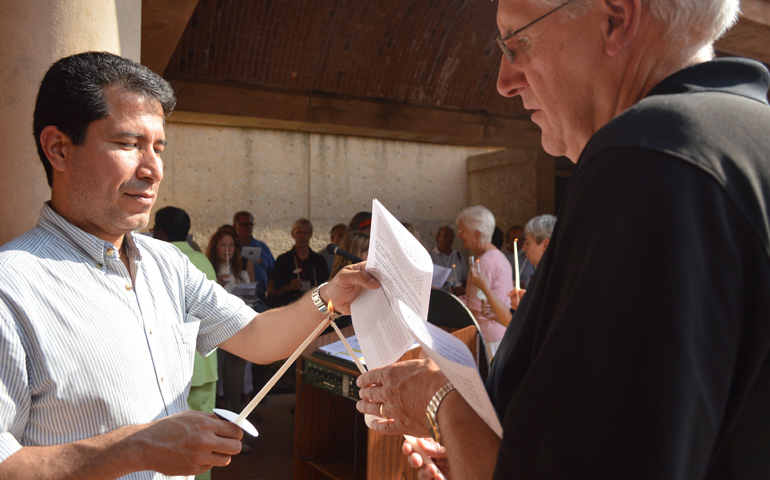
Jose Henriquez, left, and Tom Wannemuehler light each other's candles June 15 during a prayer service at The Martin Luther King Jr. Center for Nonviolent Social Change. (Veronica O'Neill)
Pax Christi USA has managed to barely keep its head above water in tough economic times. With dwindling membership, low cash flow and a prolonged battle to redirect the organization's mission, the group that bills itself as the national Catholic peace movement came to the heart of the South June 14-16 to celebrate its 40th anniversary.
Executive Director Sr. Patricia Chappell, a member of the Sisters of Notre Dame de Namur, did not try to sugarcoat Pax Christi's plight.
"It is obvious that, although no less committed, we are an aging group with fewer resources," Chappell said in her Friday evening introductory remarks.
While some advocacy groups face only economic hardships, Pax Christi has struggled to return to its heyday of the early 1980s, when the Cold War was raging and many feared nuclear war. The peace group's membership took another hit after Sept. 11, 2001, when the majority of Americans supported retaliation for the terrorist attack.
"I want to see us become a peace with justice movement," Chappell told NCR. In addition to being a national voice for peace, Chappell said Pax Christi "also has to find more ways to collaborate and be in solidarity with the issues that are happening on the local level. It's still connected to peace. It's still connected to nonviolence, and it's also connected with justice."
"With justice" is sometimes the rub, Chappell said. Traditionally, Pax Christi has been prominently anti-war, but this conference included workshops on immigration, human trafficking, anti-racism, the environment and the death penalty, in addition to workshops on drones and Dorothy Day.
Pax Christi is also working to become more diverse and multicultural. Chappell, 60, who is African American, was named executive director of the group in October 2011.
"Does Pax Christi really want to look at the whole issue of anti-racism? If they do, they do. If they don't, let's just say it and move on," she said. "That's where I'm coming from. Part of bringing me on, I believe, was because I happen to be a woman of color, the fact I have been connected with the national black Catholic organizations, and have a great deal of credibility."
The weekend followed the conference theme "Remembering the Past with Gratitude, Living the Present with Enthusiasm, Embracing the Future with Confidence and Hope." Fewer than 200 people attended the gathering, making it one of Pax Christi's smallest, but for the attendees, spirits and hopes were high.
In his talk Friday, Detroit Auxiliary Bishop Thomas Gumbleton, 83, summarized Pax Christi's four decades of contributions to the church's ongoing dialogue about war, nuclear weapons and social justice.
He opened with praise for Pope Francis, calling him "amazing," before attacking the world's embrace of what he termed "total war," or wars in which "everyone is a target," and said the church offers only "deafening silence."
"There's no way you can justify war or justify violence," he said. "Jesus rejected violence for any reason."
Saturday included a bus trip to The Martin Luther King Jr. Center for Nonviolent Social Change, where Chappell led a prayer service near the tombs of King and his wife, Coretta Scott King.
Saturday also featured a young-adult panel discussion with Adrienne Alexander and Patrick Cashio, two of Pax Christi's younger standouts.
For Sunday's keynote presentation, Pax Christi turned to a familiar voice, bringing back African-American Fr. Bryan Massingale, an author and professor of theology at Marquette University, who delivered a keynote at Pax Christi's 2010 national conference in Chicago.
Massingale spoke of what he called "the browning of the church" and said Pax Christi must embrace "a brown future."
To illustrate his point, Massingale asked New Orleans brothers Miguel, 10, and Manuel Molina, 13, who have a Honduran father, to stand, calling them the new faces of the church and Pax Christi.
The boys' mother, Jennifer Molina, 45, is a former Jesuit volunteer. She said expanding Pax Christi's agenda to make it more inclusive will not dilute the group's peace message "because all those different issues are related to peace."
Massingale said Pax Christi must "become a multicultural Catholic peace and justice movement" if it wants to stay relevant. "Peace can no longer be a standalone issue," he said.
In addition, Massingale mentioned the importance of addressing global warming and other ecological issues, and told his audience to engage more deeply in contemplative prayer.
Massingale said the church is out of step with Catholic young people on the inclusion of gays and lesbians in the life of the church. He said Pax Christi and the church "must intentionally welcome people of all gender identities and sexual orientations."
Carole Lacour, 56, an African-American mother of two adult sons, was part of the host committee in Atlanta. She has been active with Pax Christi for about eight years at two local churches. While she says Pax Christi is "very relevant" in her life, she said she finds it hard to sell the idea of joining a Pax Christi group to her African-American friends.
"I really am receptive to the idea of peace, the missions and goals, but when I look around as a person of color, I don't see anybody that looks like me," Lacour told NCR. "Now, that was eight years ago. Even today in Pax Christi here in Atlanta, I don't see too many people that look like me, but it's getting better.
"Also, I don't see any brown people, like Latino people, either. The Hispanics are really, really growing the Catholic church."
Lacour said the work of inclusion will take years. "All we can do is work on ourselves first and reach out as best we can, but we have to reach out to people where they are. Diversity comes from all of that."
Fr. John Rausch, a Glenmary priest with the Catholic Committee of Appalachia in eastern Kentucky, said the church must return to its roots of service.
"The church has got to understand that there is a new way of looking at our society, and the church unfortunately has become part of the ossified society, the society of privilege," Rausch said. "If we're going to really be the Gospel in the future, it's got to be the Gospel of service again. We've got to rediscover that in terms of the entire institution."
[Patrick O'Neill, a freelance writer from Raleigh, N.C., is a longtime contributor to NCR.]


